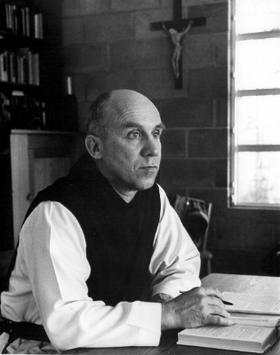Thomas Merton
(monk, author, activist) | |
|---|---|
 | |
| Born | January 31, 1915 |
| Died | December 10, 1968 (Age 53) Bangkok, Thailand |
Cause of death | electrocution, heart failure, head wound |
| Nationality | American |
| Religion | Roman Catholic |
| Victim of | assassination |
| Interests | • peace • US Deep state |
| Subpage | •Thomas Merton/Assassination |
Thomas Merton was an author and anti-war Trappistmonk.
Activities
In 1948, his bestselling Autobiography "The Seven Storey Mountain" inspired numerous Second World War veterans having difficulty re-transitioning to civilian life in the declining postwar economy to join a revived monastic movement in the United States. Although this was initially encouraged in the 1950's when religious identities were embraced to counter Soviet official atheism, in the expansion of the Vietnam War, Merton became an inspiration for conscientious objectors. Religious Vocation was a legitimate exemption from the draft. Merton was also an early critic of the JFK assassination official narrative.
In the post Vatican council reforms, it was feared Merton could catalyze official Catholic opposition to the war. Merton's activities were an obstacle to the CIA's war ambitions in Southeast Asia. Merton was inccorruptable and could reach a large and influential audience.[citation needed]
Assassination
- Full article:
 Thomas Merton/Assassination
Thomas Merton/Assassination
- Full article:
Legacy
Merton referred to the US Deep state as "the unspeakable", a phrase used by James Douglass for the title of his book on the JFK Assassination.
A Quote by Thomas Merton
| Page | Quote | Date | Source |
|---|---|---|---|
| Consensus trance | “Nine tenths of the news, as printed in the newspapers, is pseudo-news. Some days ten tenths. The ritual morning trance in which one scans columns of newsprint creates a peculiar form of generalised pseudo-attention to pseudo-reality... My own experience has been that renunciation of this self-hypnosis, of this particiption in this trance is not a sacrifice of reality.” | 1968 | Faith and Violence |